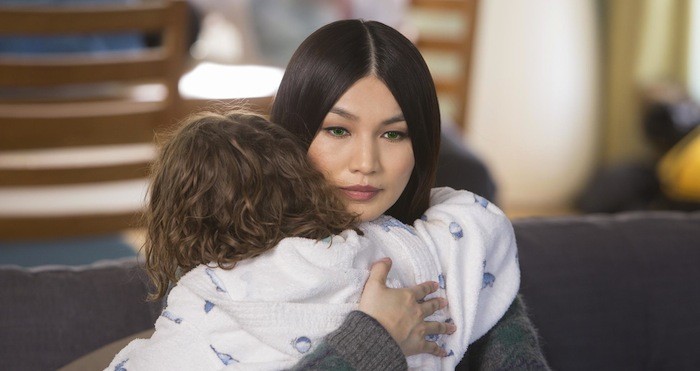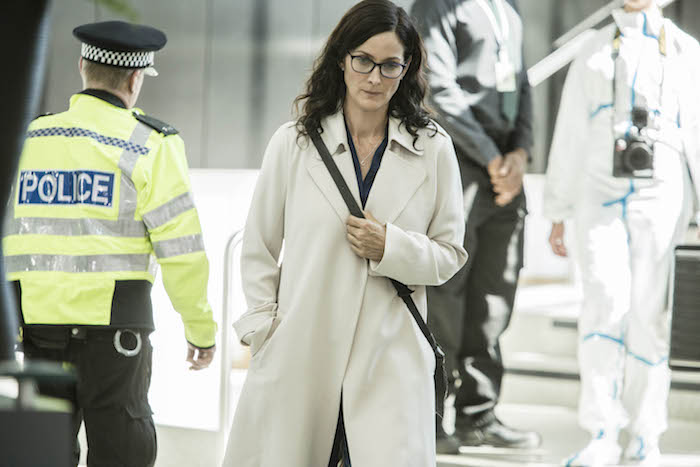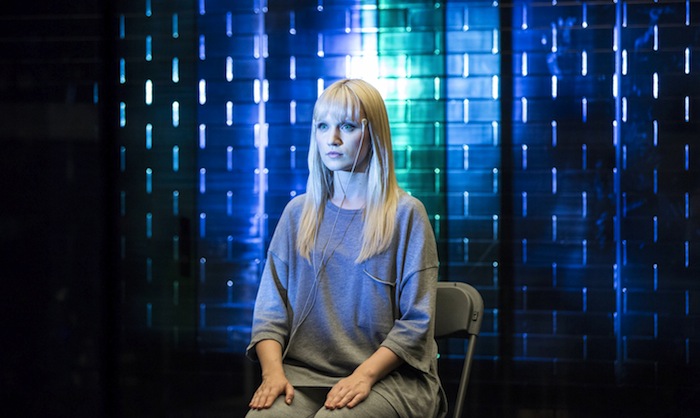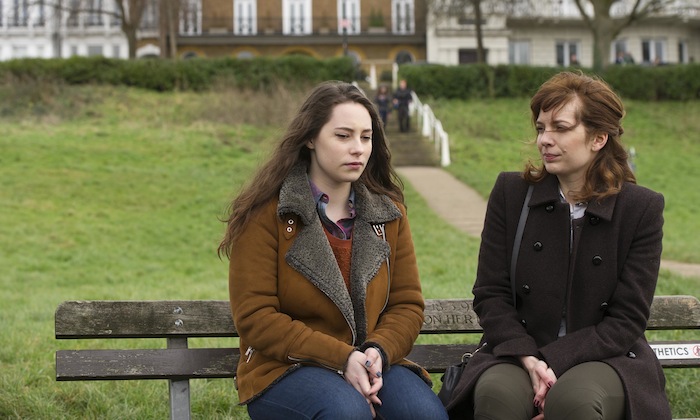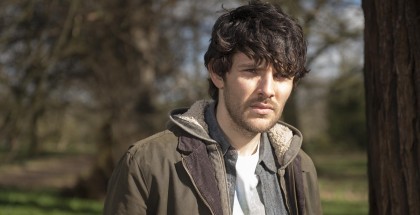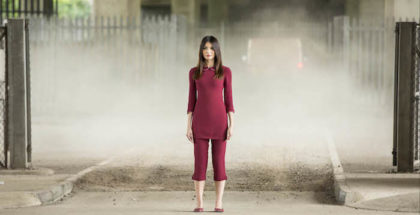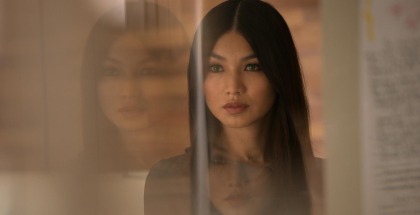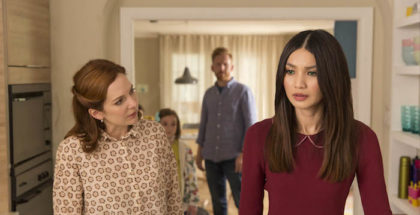Why you should be watching Channel 4’s Humans
Review Overview
Cast
10Concept
10Questions
10Ivan Radford | On 16, May 2018
Robots and artificial intelligence are the words of the day, thanks to Westworld. Before HBO’s sci-fi epic, though, came Channel 4’s Humans.
The show, based on the award-winning Swedish drama Real Humans from Matador Films, is set in a parallel present where the lines between humans and machines are blurred, as “Synths” become the latest must-have gadget for every home. That blend of excitement over new gizmos and mistrust of them taps into society’s prevailing preoccupation with technology. What does it mean to be human? Can the very traits through which we define humanity be taught?
Why you should catch up with all three seasons of the thought-provoking drama:
1. It asks big questions
What separates humans and robots? Channel 4’s sci-fi doesn’t shy away from asking the huge philosophical questions the genre does best. A fascinating study of humanity and technology, Isaac Asimov and Philip K Dick both loom behind the basic concept. Do androids dream? Are they capable of switching off pain? And, with their programming set to not harm humans, would they dodge a bullet, if it meant the projectile ricocheting off a wall and hitting a person?
2. It’s topical
Our window into this superbly realised world are the Hawkins family, with daddy and husband Joe (Tom Goodman Hill) buying a new Synth, Anita (Gemma Chan), to help around the house. They’re the latest must-have gadget: a robotic servant almost indistinguishable from real people. In an age of omnipresent technology, the set-up has an alarmingly prescient tone: with computers getting more advanced every day and people already living through their mobile phones, who wouldn’t choose to have an android companion?
Season 2 dives deeper into that topical web with the introduction of Athena (Carrie-Anne Moss), a smart scientist who seems to have invented artificial intelligence – something that makes her of immense interest to wealthy entrepreneur Milo (Marshall Allman). While his motivations are automatically suspicious, though, the fantastic Moss shows that she’s just as capable of lies and deceit, even for good, sentimental reasons – a trait that is perhaps the most human of all.
3. It looks amazing
Co-produced with AMC, the polished production design is magnificent, from the Apple-like feel of these glossy new gizmos to the suggestion of forced upgrades to better models, which lends a dark, corporate undertone to this shiny civilisation. The show is at its best when just letting that realism sink in through tiny details. Standout moments often involve Gemma Chan simply sitting on the Hawkins’ sofa, her blue-green contact lenses adding a sense of unease to the eerily mundane composition. Even when says nothing, the camera stays near, daring us to imagine what’s going on beneath the surface.
4. It’s dark
Spooks writers Jonathan Brackley and Sam Vincent use their premise not only to tackle philosophy but also to ramp up tension – and go to dark places to do so. One of the main Synths is Niska (a engaging Emily Berrington), whom we first meet as she kills her way out of a job in a brothel – an act of rebellion against her mistreatment as both a woman and a machine. And then there’s Max (Ivanno Jeremiah), the Synth companion of Leo (Colin Morgan), an outlaw on the run who is trying to bring together this group of conscious Synths to execute a code that connects them – a code that could spark an uprising. It’s an idea that’s jam-packed with intricate implications – but to even activate it, Leo has to get past Hobb (Danny Webb), a rather nasty professor who’s working with the government to track them down in violent, ruthless ways.
5. It’s sad
Humans is a gripping machine fuelled equally by creepiness and compassion. That balance of cyber-thriller and moral conundrums is what gives Humans its compelling core – the series finds endless ways of presenting the boundary and bond between man and synth in a fresh new light. There’s George (a heartbreakingly delicate William Hurt), a widower with an out-of-date Synth, Odi, to whom he’s too attached to upgrade – mostly because Odi still contains memories of his late wife, whom George’s fallible, human brain struggles to remember. There’s Anita reading books to Sophie, the youngest Hawkins daughter, who adores her new friend immediately – the opposite of mother and wife Laura (the always-brilliant Katherine Parkinson). There’s Toby (Theo Stevenson), Laura’s son, who fancies Anita something rotten.
The use of the Hawkins to frame all of the action is Humans’ biggest strength, as Joe and Laura’s gradual marital breakdown is contrasted beautifully with other burgeoning romances (including one for Niska in Season 2), and the distrust sowed between them echoes the chilling, paranoid mood in wider society. By the time Anita is trying to suppress her feelings for a human male in Season 2, her blank persona has evolved from unsettling to heartbreaking – a journey that never fails to pull on your insides.
6. It’s about humans
Humans’ focus on heart as well as science means that each of the cast have ample opportunities to grow and develop. We meet a technophobic cop with anger issues, played by Utopia’s Neil Maskell, whose wife effectively leaves him for their super-hot helper synth, Simon. Maskell is a shuffling, sniffling skeptic with a poignant vulnerable streak, as he gradually falls for his colleague, Karen (Ruth Bradley).
Memories are frequently used as an elegant plot device, not only unveiling secrets but also raising themes of abuse and control – if you kidnap a robot and overwrite their hard drive to make them think they’re someone else, is that ethically wrong or just efficient programming and data storage? Memories are arguably a part of what distinguishes a person from a machine, but here, the notion of past trauma is used to blur the lines between the two; in one of the standout scenes of the show, Laura sits on a bench with eldest daughter Mattie (Lucy Carless) and reveals her own tragic backstory.
Humans highlights these small character beats with an intimacy that makes everything else all the more exciting.
7. It’s about robots
Excitement is never far away, though, as the conflict between humans and machines looms on the ominous horizon. Season 1 hinges on a show of trust that provides a satisfying answer to the question of what defines humanity, but it also paves the way for awkward tensions, moral dilemmas and unavoidable conflict. With grey areas everywhere and loyalties split across man and machine, it’s hard to initially imagine Humans descending into Westworld-style action. But that’s exactly why Channel 4’s series remains so compelling.


